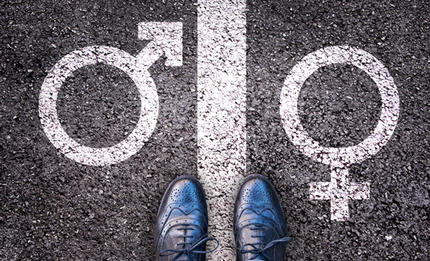IWSAW Hosts Talk About Transgender Women in Lebanon
The Institute for Women’s Studies in the Arab World promotes inclusiveness as part of the Food 4 Thought series.
On November 21, 2017, the Institute for Women’s Studies in the Arab World (IWSAW) welcomed a researcher and a participant from Baynetna, a recently conducted study into the sexual and mental health needs of trans feminine individuals in Lebanon. The talk, attended by students, faculty, visiting scholars and interested individuals, was part of IWSAW’s monthly Food 4 Thought series, which aims to encourage youths to consider and debate diverse issues related to gender.
Cynthia El Khoury — a scholar specialized in sexual and reproductive health and rights, and the research director of Baynetna — introduced the audience to the purpose and methodology of the study before handing over the floor to Sarah Wehbe.
As part of the research, Wehbe facilitated the focus-group discussions that gave insight into the challenges facing trans women. “We’re not a community yet, so it took a while for everyone to trust each other and trust us,” she explained, adding that the session dedicated to discussing family ultimately helped the women forge stronger bonds. “We need to be a stronger community in order to demand our rights.”
El Khoury agreed, noting that prior to the research, “We knew so little about trans women. Now they want to organize.” Asked whether the trans community would work in tandem with human rights groups, El Khoury explained that, while some human- and gay-rights groups refer to trans in their communications, the lack of organization to date within the community has meant that little attention has been paid to their specific needs.
Individuals have, however, fought and won legal cases in the country. In a landmark decision, a judge at the Lebanese Court of Appeals granted an individual who had undergone full gender-reassignment surgery the right to legally have his sex changed. “It is legal to identify yourself as trans in Lebanon, there is nothing to prevent it,” noted El Khoury, adding that many trans women did, however, suffer harassment at the hands of both the public and the police.
Asked whether the trans-rights movement should be trans-national, El Khoury noted that, at least as far as the terminology was concerned, she had observed commonalities between communities in different countries of the Middle East. IWSAW director Lina Abirafeh invited El Khoury and other scholars in attendance to develop a reference guide for such terminology. “People usually don’t want to offend, but a lack of knowledge or familiarity inadvertently results in awkwardness if not offense.”
This desire to promote an inclusive environment and mentality among the student population of LAU is what drives the Food 4 Thought series. “It’s a platform to showcase ordinary women who have done extraordinary things,” explained Abirafeh. “I’d like students, and everyone, to see that sometimes when you find your own voice and use it in service of others, you end up giving voice to something that needs to be exposed, shared, and addressed. In that way we can all be activists and pioneers.”
The next session in the Food 4 Thought series will be held on December 7, 2017, and will discuss the role of art in combatting violence against women, on the occasion of the 16 Days of Activism to End Gender-Based Violence.
More
Latest Stories
- Bolstering Cancer Care Through Psychology at LAU
- Alumni Solidarity and Support Dinner in London Gives Hope to LAU and Lebanon
- The LAU Genetics Team on a Discovery Streak
- In Loving Memory of LAU Student Mohamad Nasrallah
- Alumnus Hussein Freijeh: From Local to Global and the Lessons Learned in Between
- LAU’s Research Excellence Shines: 25 Faculty Members Ranked Among World’s Top Scientists
- How Can I Be Happy in These Trying Times?
- Engineering Students’ Projects Secure Funding at the National Level


